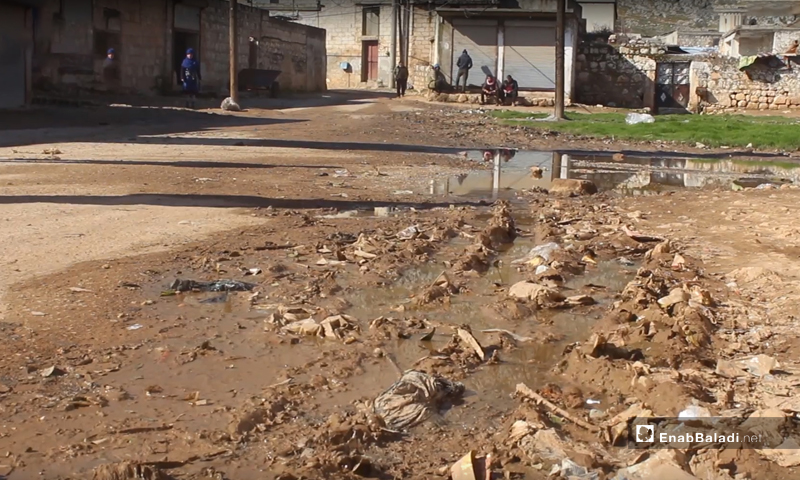The residents of Sardin village in rural Idlib are suffering from the lack of proper household sanitation systems in the area, which exacerbates the spread of diseases among the village people, most prominent of which is “Leishmaniasis.”
Through its program “What is your problem”—the program is broadcast on Enab Baladi’s social media platforms every Friday and Monday—Enab Baladi surveyed a proportion of Sardin’s residents, about the sanitation problem in the area.
The residents of the village interviewed by Enab Baladi complained that all village houses depend on pit latrines in which the wastewater used for cooking and laundry gathers. Moreover, bathroom waste ends in these ditches. Eventually, the gathered waste flushes out to the streets of the village.
This waste leakage causes the spreading of insects that carry infectious diseases to people in general and children in particular.
Enab Baladi’s program also revealed that damages caused by the lack of sanitation facilities have gone beyond the residents of Sardin Village. It adversely affected the crops of the village fields; the uncontrolled flow of wastewater led to the drought and death of several olive trees and other plants.
Lack of medical care
In addition to the sanitation problem, Sardin village and its surroundings also lack adequate medical care centers.
Bilal Hussein, a resident of Sardin village who works as a nurse at a medical point in the neighboring village Qurqani, said to Enab Baladi, “the village does not have a medical facility.
This problem has doubled the intense suffering of people, especially after the widespread outbreak of skin diseases in the village”.
Hussein confirmed to Enab Baladi the absence of an accurate statistic about the exact number of people infected with Leishmaniasis. He pointed out that the medical point he works in conducted medical check-ups for 120 Leishmaniasis cases in a month in the last year.
He added, the medical check-ups are not only for Sardin villagers but also for other people from surrounding villages.
Hussein clarified that the medical point of Qurqani is treating patients with Leishmaniasis by local injection in the infected area or by intramuscular injection. He said the Qurqani medical center has a special division to follow up on the patients of Leishmaniasis, equipped with medical professionals.
Old problem
Ahmad Abdulghani, a member of Sardin local council, emphasized to Enab Baladi that the sanitation problem is not a new one.
He said the residents of the village used to address this problem individually by opening ditches outside their houses or pit latrines inside or outside their homes. Abdulghani noted that the local council made numerous appeals to the supporting organizations to solve the sanitation problem; however, the calls remain unanswered.
Abdulghani confirmed that Sardin local council has already prepared a study for a sanitation project in the village in case any organization offered to help.
Nevertheless, Abdulghani said the local council alone is unable to set up sewage systems and water networks or build a medical center within its available material resources. The project’s cost exceeds the council’s financial ability, which means the pollution-related disease crisis will not be solved any time soon.
What is Leishmaniasis?
Leishmaniasis is a parasitic skin disease transmitted through infected sand-fly bites.
The sand-fly lives in moist and dark places such as animal farms, garbage dumpsters, dogs, and rats’ pens. The fly sucks the blood out of an infected animal, and this blood has the parasite that causes the disease. The parasite multiplies in the fly’s stomach and then moves to its saliva, and when it bites a human, animal, or healthy bird, it injects the parasites into its body, causing the disease.
According to a medical report by Dr. Karim Maamoun published before by Enab Baladi, the sand-fly can transfer the disease from animal-to-human or human-to-human.
Dr. Maamoun mentioned that Leishmaniasis prevention methods include wearing clothes that cover the entire body, using bed nets, or insects’ repellent creams. Leishmaniasis can also be prevented by using insecticide and by eliminating the infected rodents that help to increase the number of sand-flies that hide in the daylight and become active at sunset and in the evening.

